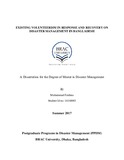Existing volunteerism in response and recovery on disaster management in Bangladesh

View/Open
Date
2017-12Publisher
BARC UniversityAuthor
Ferdaus, MuhammadMetadata
Show full item recordAbstract
Community participation is the most effective elements to achieving sustainability in dealing with natural disaster risks. As a disaster, prone country Bangladesh is affected by different types of natural hazards like tropical cyclones, tidal bores, floods, tornados, river bank erosions, earthquakes etc. almost every year and destroy many lives and resources of people. It is surrounded by thousands of rivers, in the North the Himalayan range and in the South the Bay of Bengal creates harsh weather especially for a large number of poor people live in the southern part of Bangladesh making them as common victim of natural calamities, sometimes the vulnerability is so miserable that they must resettle themselves in the newly accreted land. For sustainable development, the negative impacts of these natural hazards must be minimized that affecting the socio-economic condition. The prevention of occurrence of natural disasters influenced by natural causes may be impossible but it can be reduced by proper planning, management and human collective participation. From realization of this reality, the government of Bangladesh has adopted disaster management plans and programs for the mitigation of disaster and its possible adverse impacts. This study analyzes the approaches to disaster management by grassroots community participation in Bangladesh based on literature review.
